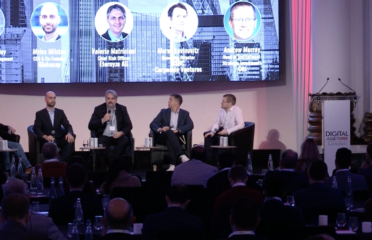Why Digitisation Matters – A Catalyst for Change in Private Equity

This post is part of a series on The Digital Transformation of Private Equity: Unlocking Opportunities in Private Markets. If you’d like to download the full report, click here.
With around $13.1 trillion in AUM (as of June 2023), private markets are less than one-eleventh of their public counterpart, however, over the last decade, private markets AUM has grown nearly 14 percent a year, driven by increased allocations from institutional investors17. This showcases a major opportunity which is only going to become greater, and with so much future growth in prospect, there’s an evident gap that needs to be bridged with technology.
The process of buying/selling PE, credit, property, or alternative assets is complex, with the average private equity deal having around 12 steps to complete. These include; sourcing, signing a non-disclosure agreement, initial due diligence, investment proposals, first-round bids, further due diligence, creating an internal operating model, producing a preliminary investment memorandum, final due diligence, gaining final investment committee approval, submitting a final binding bit and signing the deal, but this ‘final’ is just the beginning.
Throughout the lifecycle of the investment, PE managers will need to consider portfolio management, value creation, further fundraising, capital deployment and eventually, exit strategies. Despite the current macroeconomic climate, private markets continue to remain resilient and PE firms who don’t grasp digitisation with both hands could find themselves struggling to cope with the pressures ahead.
Challenges
Some of the challenges faced by those who don’t adopt technology could include:
- Manual, time-consuming processes and reporting complexities: Across all industries, 77 per cent of employees believe that automating tasks would “significantly” boost their productivity18 and specifically within PE, these saved hours can add up to significant boosts in revenue and employee satisfaction. Digital transformation can rapidly improve manual work for PE firms, especially when it comes to reporting and the complexities involved. Without advanced technology like artificial intelligence (AI) and machine learning (ML) reporting becomes a slow and burdensome process. As PE firms scramble to capture market opportunities, those that miss out on valuable tech-generated insights will miss out.
- Data fragmentation and inefficiencies: Many banks, investment houses and legacy institutions still use legacy technology like mainframes to operate their business. The major problem with this is that it operates in siloes, meaning data cannot be shared across departments so there’s no “single source of truth”. This leads to repeated, fragmented, or incomplete data that doesn’t just make more work, it also slows things down for clients. Maria from Clean Growth Fund believes this is the biggest challenge for firms on their digital transformation journeys. She comments that “to onboard new technology, you need a clean data set. That’s easy if you’re starting from scratch, but in reality, firms have legacy data spread across multiple legacy systems and as you collect more data, you’re fragmenting it more and more.” By contrast, firms that have upgraded to a cloud-based infrastructure can seamlessly share data, increasing efficiency and allowing for state-of-the-art analytics.
- Risks of human error: Research from Verizon found that an incredible 82 percent of all data breaches are caused by human error19. This is hugely significant for firms, as the UK GDPR and DPA (2018) set a maximum fine of £17.5 million or 4 percent of annual global turnover – whichever is greater for data breaches20. As of 2021, the average fine for a data breach was £2.8 million21 . Although for financial services, it can be significantly higher. Morgan Stanley was recently fined $60 million for data protection failings by the Office of Comptroller of the Currency (OCC). In 2021, 116 counts of data reaches were reported to the Financial Conduct Authority23, and firms that don’t close the human error gaps with technology expose themselves to insurmountable reputational damage and fines.
- High costs for third-party involvement: As well as increasing the risk of regulatory fines and wasting in-house skills, a lack of digitisation can also lead to higher third-party costs. According to the Private Funds CFO 2022 survey, “The past year has seen a significant rise in outsourcing across the board”24. Unsurprisingly, most of the outsourcing occurs in IT departments, as PE firms grapple to meet the intensifying demands of customers, operations, and regulations. The next most outsourced areas are tax, fund accounting and compliance25.
“You have to bite the bullet and either evolve or die. It’s a tough economic environment out there and we’re seeing more and more consolidation in the industry. Digital transformation is about more than operational efficiencies – the world is moving and firms need to keep up.”
Maria Khan
Head of Compliance, ESG and Ops at
Venture Capital firm Clean Growth Fund
Rationale for Digitsation
There seems little doubt that shying away from technology to maintain the status-quo from the last century is costing PE dearly. While public markets have grown exponentially, private markets are at around one eleventh of the size. Yet, with significant growth on the horizon, there are many ways that PE firms could benefit from digitisation. Some of the greatest potential returns on investment are:
- Improved operational efficiency: It’s already well-documented that technology is helping us to work faster and better than ever before. 71 per cent of employees agree that digital tools help them to stay productive, even when they are having trouble focusing on work26 and for managers, that figure rises to 77 percent27 . Within PE, there are significant efficiency gains to be made within reporting and admin management. Maria from Clean Growth Fund comments that during her 20 year career, she has seen the deal flow process (from termsheet generation to funding) reduce significantly as technology introduces operational efficiencies. She comments that “a process that typically took three to four months can now take as little as two weeks for a simple deal. Cutting the typical deal time so dramatically is hugely beneficial – it frees up resources to provide real expert oversight, rather than exchanging multiple emails and checking data as was previously the case.”
- Better decision making: A 2018 Preqin survey of 300 PE managers found that around 70 percent acknowledge that the degree of digitalisation could influence their investment decisions28. One of the most vital areas where it can play an integral role is within deal-sourcing. Some firms have already created proprietary machines that scan the market to find the best and most bias-free opportunities.
- Lower cost of capital for GPs: As competition rises, keeping the cost of capital down is essential for GPs. There are many areas where technology can materially assist in achieving this and according to the Private Funds CFO Survey in 2022, around 50 per cent of managers found that adopting technology has been either moderately or highly successful when it comes to returns29.
- Reduced friction for Limited Partners (LPs): Creating a seamless environment for LPs is one of the major benefits of technology in PE. Reports show that LPs are asking more and more questions at the due diligence stage and seeking increasingly detailed answers. With personalised portals and real time reporting, the experience becomes much smoother and more transparent for all parties.
- Enhanced client experience: In today’s always-on digital age, clients have quickly become accustomed to hyper-personalised, instant information. They want to be able to view their wealth across a variety of in-person and digital
channels at any time and the only true way to do this is by harnessing the power of digital transformation. Lagging behind is not an option for managers. The process of onboarding also needs to be smooth and seamless for clients if firms want to maintain investor relationships. - More robust regulatory processes: As we will cover extensively; digitalisation is essential for firms to stay up to date
with the flood of incoming regulations. It’s also needed to efficiently complete checks, flag anomalies, improve due
diligence and KYC and make the most out of valuable resources. - ESG and sustainability benefits: While many private equity firms are interested in promoting good governance, according to some leading academics, “the E and the S have been virtually non-existent”. In a recent Harvard Business Review article, they wrote, “The industry has been content to seek returns with little concern for the long-term sustainability of portfolio companies or their wider impact on society”30. Maria from Clean Growth Fund firmly believes that digital transformation is key for ESG reporting, particularly for Venture Capital and Private Equity firms. She comments, “When we’re looking at emissions, we not only need data on our own carbon emissions, but those of our portfolio companies. And this is data that they are not necessarily collecting. Adopting digital solutions would be a huge help in automating this time-consuming process.”
GPs have noticed a surge in demand. Almost nine in 10 said they are ‘always’, or ‘sometimes’ asked by LPs if they have an ESG consultant to advise on responsible investing – a 13 percent increase from the 2021 survey31, but there are a range of technological solutions on the market to help PE firms provide granular reporting at the touch of a button, with data analysis to offer extremely detailed visual datasets. It’s no secret that having the right ESG processes in place will take time, but encouraging LPs to utilise digital platforms is a huge step towards positive environmental impact in private markets. The solutions that utilise cloud-based services such as AWS, whose electricity consumption is currently 90 percent
from renewable sources and will be 100 per cent from renewable sources by 202532 encourage a digital-only footprint.
16Source: McKinsey
17Source: McKinsey
18Source: Slack
19Source: Verizon
20Source: IT Governance
21Source: 6dg
22Source: BCMP
23Source: FCA
24Source: Private Funds CFO Survey
25Source: Private Funds CFO Survey
26Source: Adobe
27Source: Adobe
28Source: Preqin
29Source: Private Funds CFO Survey
30Source: Harvard Business Review
31Source: Private Funds CFO Survey
32Source: AWS


















